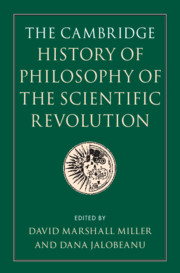Book contents
- The Cambridge History of Philosophy of the Scientific Revolution
- The Cambridge History of Philosophy of the Scientific Revolution
- Copyright page
- Contents
- Tables and Figures
- Contributors
- Preface
- Introduction The Disciplinary Revolutions of Early Modern Philosophy and Science
- Part I The Disciplines
- Part II Disciplinary Activities
- 8 The Art of Thinking
- 9 Astrology, Natural Magic, and the Scientific Revolution
- 10 Practitioners’ Knowledge
- 11 Medicine and the Science of the Living Body
- 12 Experimental Natural History
- 13 Celestial Physics
- 14 Applying Mathematics to Nature
- 15 Mathematical Innovation and Tradition: The Cartesian Common and the Leibnizian New Analyses
- 16 Mechanics in Newton’s Wake
- Part III Problems and Controversies
- Bibliography
- Index
8 - The Art of Thinking
from Part II - Disciplinary Activities
Published online by Cambridge University Press: 14 January 2022
- The Cambridge History of Philosophy of the Scientific Revolution
- The Cambridge History of Philosophy of the Scientific Revolution
- Copyright page
- Contents
- Tables and Figures
- Contributors
- Preface
- Introduction The Disciplinary Revolutions of Early Modern Philosophy and Science
- Part I The Disciplines
- Part II Disciplinary Activities
- 8 The Art of Thinking
- 9 Astrology, Natural Magic, and the Scientific Revolution
- 10 Practitioners’ Knowledge
- 11 Medicine and the Science of the Living Body
- 12 Experimental Natural History
- 13 Celestial Physics
- 14 Applying Mathematics to Nature
- 15 Mathematical Innovation and Tradition: The Cartesian Common and the Leibnizian New Analyses
- 16 Mechanics in Newton’s Wake
- Part III Problems and Controversies
- Bibliography
- Index
Summary
This chapter proposes a contextual approach to the history of early modern logic and method from the perspective of the late seventeenth-century debate over the relative worth of ancient and modern learning. Reflections on a modern “art of thinking” by authors on both sides of the debate contributed to the construction of an image of philosophical modernity at the high point of the Scientific Revolution, which would subsequently help fashion the self-understanding of the Enlightenment. This image was inherently polemical and pluralistic, as shown by analyzing the variety of canons of authors and by identifying the diversity of positions on the ingredients of the modern “art of thinking” in their writings. And yet the points of disagreement also reveal an underlying consensus about the core features a logic required: that an art of thinking would have to express the natural operations of the human mind, would ground the pursuit of the sciences, and would be capable of leading the mind to the discovery of genuinely novel and valuable truths about the natural world. This chapter also provides a reevaluation of the traditional canon of important thinkers who are thought to have spearheaded modernity.
Keywords
- Type
- Chapter
- Information
- The Cambridge History of Philosophy of the Scientific Revolution , pp. 149 - 166Publisher: Cambridge University PressPrint publication year: 2022
- 3
- Cited by



